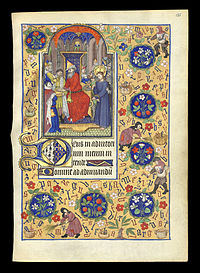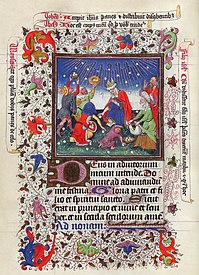Deus, in adiutorium meum intende

Deus, in adiutorium meum intende (česky Bože, pospěš mi na pomoc) a odpověď Domine, ad adiuvandum me festina (Pane pospěš mi pomáhat) je responsorium (preces), kterým začínají jednotlivé modlitby breviáře. Zvolání vychází ze žalmu 70.
Užití
Používá se při modlitbě breviáře,[p 1] všechny dny kromě posledních tří dní Svatého týdne a modliteb za zemřelé. Při modlitbě se přítomní znamenají znamením kříže.[1] Bezprostředně většinou následuje modlitba Sláva Otci.[2]
Galerie
Ježíš Kristus v Getsemanské zahradě a Jidášova sebevražda s textem Deus in adiutorium (Přebohaté hodinky vévody z Berry)
Pilát Pontský si umývá ruce s textem Deus in adiutorium (Hodinky velkovévodkyně Markéty Orleánské)
Seslání many s textem Deus in adiutorium s odpovědí a Sláva Otci (Hodinky vévodkyně Kateřiny Klévské)
Odkazy
Poznámky
- ↑ V římském a ambroziánském breviáři, také v mnišských breviářích.
Reference
- ↑ Deus in Adjutorium Meum Intende [online]. newadvent.org [cit. 2022-01-07]. Dostupné online. (anglicky)
- ↑ Deus in adjutorium [online]. cpdl.org [cit. 2022-01-07]. Dostupné online. (anglicky)
Související články
Média použitá na této stránce
Grandes Heures de Jean de Berry - Mont des oliviers et suicide de Judas (fol. 65) "Deus, in adiutorium meum intende"
Horae ad usum romanum, Book of Hours of Marguerite d'Orléans (1406–1466), folio 135r., miniature of Pilate washing his hands of the fate of Jesus. Around, peasants collecting letters of alphabet. CoA of Brittany and Orleans in the Initial letter.
The Gathering of the Manna. Hours of Catherine of Cleves. Manuscript MS M. 917-945 ff 137v. Morgan Library New York, around 1440.
[Horizontal Latin text transcribed from image:] Joh(ann)es ~ Accepit ihesus panes et distribuit discumbentibus Jhesus ~ Hoc est corpus meum q(u)od p(ro) trade(tur) Deus in adiutorium meum intende. Do mine ad adjuvandum me festina. Gloria patri et fi lio et spiritu sancto. Sicut erat in principio et nunc et sem per, et in secula seculorum ame(n). Ad nonam. [Vertical Latin text transcribed from image:] Filij isr(ael) Cum vidissent filij isr(ael) panes dixerunt manhu.[? i/et.qenhoc ?] Moyses Ecce ego pluam vobis panes de celo. [Comment: The horizontal texts quote: H1. New Testament Bible book John 6:11 Accepit ihesus.... H2. New Testament Bible book 1 Corinthians 11:24-25 Hoc est corpus meum... H3. First verse of Psalm 70 (Psalm 69 in the Vulgate) Deus in adiutorium... H4. The Gloria Patri, also known as the Glory Be to the Father or, colloquially, the Glory Be, is a doxology, a short hymn of praise to God in various Christian liturgies. The vertical texts quote: [left] V2: Exodus 16:4 Moyses Ecce ego... [right] V1: Exodus 16:15 Filii Isr(ael) Cum vidissent .. Conclusion: Connection of manna with bread in the Bible. The Latin texts on the original page link the miracle of the manna in the Jewish Bible with bread as the symbolical body of Christ in the Christian New Testament and with the bread distributed by Jesus in a another miracle. Quotes are from John 6:11, 1 Corinthians 11:24-25, the Gloria Patri, Exodus 16:4 en 16:15.]
Autor: Der wahre Jakob, Licence: CC BY-SA 4.0
Deus, in adiutorium meum intende
Eröffnungsversikel zu den Horen des Stundengebets
Quelle: Antiphonale Romano-Seraphicum pro horis diurnis, Desclèe, Parisi, Tornacoi, Romae 1928, S. 2





